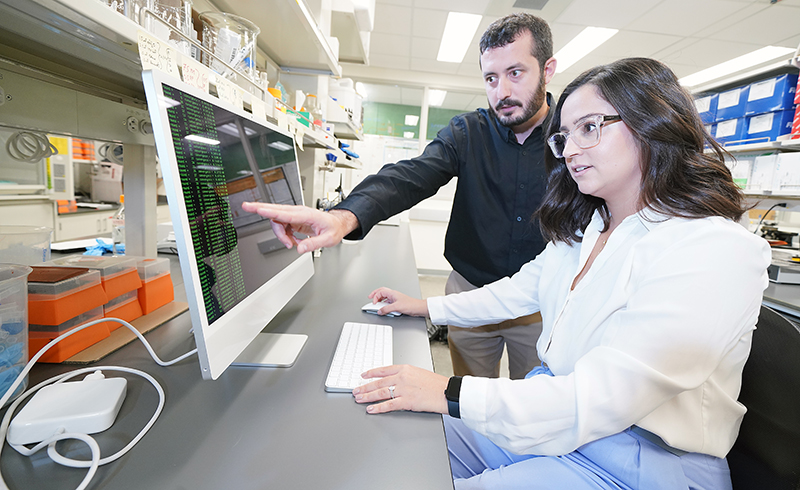Amanda Alvarenga
Agricultural advancements are essential for coping with issues of food security. Through genetics, we can provide farmers with tools to strategically breed individuals for the next generation of offspring, while simultaneously addressing social issues.
- Amanda Alvarenga, PhD student, Department of Animal Sciences
The student
Amanda Alvarenga’s passion for agriculture dates to age 10, when her mother began working her family’s dairy farm while her father operated a photography business in the nearby city of Lavras, in southeastern Brazil. Both of Alvarenga’s paternal and maternal grandparents farmed, “but I wasn’t a big fan of the daily hands-on work,” she says. “I thought I would be a math teacher.” No one in her immediate family went to college, but Alvarenga followed the lead of a great-uncle, an agricultural statistics professor with whom she shared an interest in math and statistics. He advised her to choose different universities during her academic career to learn from varied research groups. His suggestion took her first to the Federal University of Lavras, where, on her way to a BS in animal sciences, she discovered quantitative genetics. She completed an MS in animal sciences and pastures with a focus on quantitative genetics and genomics at the University of São Paulo and decided to pursue a PhD in the United States. She took a year off to study English in preparation for the prerequisite TOEFL exam, but her first three attempts were unsuccessful. Alvarenga then started her PhD at the Federal University of Viçosa in her home country. Shortly thereafter, Luiz Brito, associate professor of animal sciences, offered her a position in his Purdue lab based on the recommendation of her Viçosa advisor. She persevered to pass the TOEFL exam, arriving at Purdue in 2019.
The research
“The main subject of Dr. Brito’s lab is quantitative genetics and genomics focused on behavioral, welfare and climatic resilience traits in livestock,” Alvarenga says. She extracted information from data on over 400,000 animals provided by the American Angus Association to develop models that accurately estimate the breeding value of behavioral traits and unravel genomic mechanisms influencing cattle temperament. “We want to help farmers identify animals that are genetically docile for direct impact on farmer safety and animal welfare, which are important factors for consumers,” she explains. “Most students in the Animal Genetics class where I was a teaching assistant think genetics is more theoretical, but our research is directly impacting producers.” Alvarenga also collaborated with the American Angus Association and Angus Australia on an international genomic evaluation for hoof health and conformation traits, which will impact the welfare of future generations of Angus cattle.
Opportunities
Alvarenga enjoyed her experience as a TA at Purdue. She also benefited from her department’s links with industry and completed an internship at the American Angus Association. She presented at two international conferences and published three scientific papers based on her doctoral research, with two additional articles under review. Alvarenga has received various scholarships as well as early graduate career recognition, including 2021 and 2022 LOUJA Awards for an outstanding research paper based on original research and excellence of presentation. Brito, she adds, encouraged her to combine statistics, genetics and physiology for more interdisciplinary training.
Future plans
Alvarenga defended her thesis in September and accepted a job as a data scientist focused on plant breeding at Corteva Agriscience in Iowa, where she will partner with plant breeders to drive analytical gains. “All areas of agriculture interest me, whether they directly or indirectly impact growers,” she says. In her spare time, she and her husband enjoy cycling, basketball —“especially of the Boilermaker variety!” — and movies. The recently married couple is planning a ceremony and reception in Brazil next year.